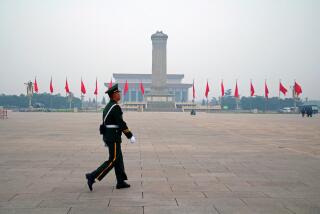Former China security chief Zhou Yongkang reportedly probed for graft
BEIJING -- Depending on where your sympathies lie, Chinese President Xi Jinping is either in the midst of an admirable campaign to rid the government of corruption or a cynical purge of his political enemies.
The latest casualty is Zhou Yongkang, the feared domestic security czar under the previous government who was formally placed under investigation this month, according to numerous reports in the overseas media.
The mottled-complexioned, square-jawed Zhou, 71, has long been the bête noire of Chinese liberals, blamed for excesses against dissidents and for rampant corruption in the state oil sector, where he was an official earlier in his career.
But the offense leading to Zhou’s downfall, political analysts believe, is being part of a rival political faction whose most notable members include the former president, Jiang Zemin, and the recently convicted former Chongqing party secretary Bo Xilai.
“Among the people I talk to, there is a consensus that this is all about a power struggle,’’ said Zhang Lifan, a prominent Communist Party historian based in Beijing.
During Bo’s trial in August, testimony emerged (though most of it was expunged from the transcripts) about how the domestic security apparatus then under Zhou’s command allegedly tried to cover up the killing by Bo’s wife of a British expatriate, Neil Heywood, with whom she had a business dispute. Some claimed that Zhou’s efforts to protect Bo, one of his proteges, were tantamount to insubordination or even to a coup against the leadership.
A special investigation unit focusing on Zhou was set in place in late August, according to Ho Pin, the New York-based head of the Mirror Book publishing house, which has reported extensively on the case.
“We are very confident of our information,” Ho said. “Xi Jinping’s anti-corruption investigation is completely centered around Zhou Yongkang.’’
Political analysts said the Chinese leadership had been expected to announce the charges by this week, but might have held back for fear of being compared to North Korea, where leader Kim Jong Un last week had his own uncle executed on allegations of an attempted coup d’etat.
“They were ready to go public, but then all of a sudden, North Korea announced the purge and it would have looked embarrassing,” Zhang said. Unlike in North Korea, the Chinese leadership is likely to eschew any overtly political charges.
“In Mao Zedong’s time, they used to charge people with political crimes, but now it is easier to charge them with economic crimes. It is a low-cost way to take out opponents without the party’s ugly secrets and infighting,” Zhang said.
“Any allegations about a power struggle would be damaging for the party,’’ added Jin Zhong, a Hong Kong-based political analyst and editor.
Chinese investigators have for months been circling the giant state-owned oil companies, including China National Petroleum Corp., or CNPC, where Zhou spent much of his career. Several of his proteges are also under investigation. In early September, the Chinese government announced that it was investigating Jiang Jiemin, the former chairman of the oil company.
As with other recent corruption investigations, it is alleged that ill-gotten gains were funneled through family members -- in this case, Zhou’s son, Zhou Bin, and his in-laws.
Caixin, a respected business magazine, reported last month that some of the allegations involve low-quality oil well equipment from China that was sold to Iraq under the guise of being manufactured in the United States. Zhou Bin lives part-time in Los Angeles but is believed to be back in China because of the investigation.
The elder Zhou retired as a member of the Politburo Standing Committee, the highest body in the Communist Party and therefore China, during last year’s party congress. At that same meeting, Xi was elevated to Communist Party general secretary and in March assumed the presidency.
If Zhou is charged, he will technically be the highest-ranking Chinese official to be prosecuted since the 1970s. Standing committee members, past and present, have enjoyed an informal immunity from prosecution since then.
Under Chinese procedure, Communist Party officials are first investigated internally by the party’s Central Commission for Discipline Inspection, and a decision could be made not to file public criminal charges.
“Zhou is already retired. He doesn’t present so much of a threat, so they don’t need to go hard on him,” said political analyst Jin.
In his first year, Xi has made the anti-corruption drive a major theme of his new administration.
“If we look back at 2013, anti-corruption was the hottest key word in China,” claimed an editorial Monday in the state-run New China News Agency. “The new generation of leaders had launched a multi-pronged approach against corrupt officials.”
Critics point out, however, that Xi’s government shot down proposals that would have required Communist Party officials to file reports revealing their personal wealth. This year, more than a dozen anti-corruption activists have been detained, and one of the most prominent, Xu Zhiyong, was formally charged last week with “disturbing public order” for organizing a demonstration that called for disclosure of officials’ assets.
The Chinese government has also refused to renew journalist visas for the China-based staff of the New York Times and Bloomberg over reporting about the leadership’s wealth.
ALSO:
China state media posts images from moon rover
Heavy rain and snow cause deaths, evacuations in Middle East
After uncle’s execution, North Korea’s Kim Jong Un reappears in public
Twitter: @BarbaraDemick
More to Read
Start your day right
Sign up for Essential California for news, features and recommendations from the L.A. Times and beyond in your inbox six days a week.
You may occasionally receive promotional content from the Los Angeles Times.





